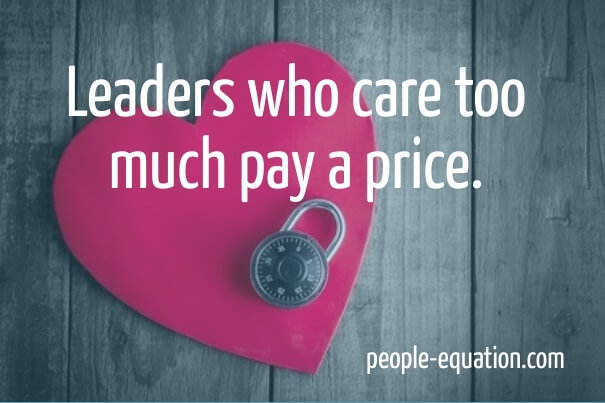Most people want to work for a caring boss. Not only is it more enjoyable, it’s good for your health, according to research by Stanford professor Jeffrey Pfeffer. Compassion is certainly a hallmark of leadership effectiveness. But can a leader care too much? Shelley Row, a professional engineer and former transportation executive believes that caring for one’s employees, while admirable, does have its drawbacks. It can stunt your team members’ professional and personal growth. Moreover, misplaced concern and worry can overload leaders. Here’s what to know about steering clear of this leadership pitfall.
Is it compassion or control?
Row’s book, Think Less, Live More: Lessons from a Recovering Over-Thinker explores the ways in which leaders might “over-function,” meaning they assume more control or responsibility over a situation than is required. Over-functioning and micromanagement share a common element: the refusal to release control. Strangely enough, the act of “caring”, when taken too far, is a control issue. For example, when a leader avoids making difficult decisions because he is concerned about an employee’s reaction, he has crossed the line from compassion into over-functioning. It’s as if the leader has assumed responsibility for an employee’s reaction to the situation, thereby transferring who “owns” (or controls) the emotion from the employee to the manager.
According to Row, it all comes down to understanding interpersonal boundaries: the space where your responsibility as a leader ends and your team members’ begins. “[Some leaders] invest a lot of energy trying to make sure that they don’t do anything to hurt people’s feelings. But people get to have their feelings; we don’t have control over that,” explains Row. For example, in a difficult conversation in which you need to address an employee’s lack of performance, as a leader your responsibility is to hold a fair, compassionate and respectful discussion with the employee. That’s where your responsibility ends. Understandably, you might be concerned about the employee’s reaction, especially if the two of you have a history of contentious conversations. Your employee’s reaction is not your responsibility. The employee gets to choose his or her reaction. Too much worrying about “how Stan will take this” or “If I fire Melanie it will devastate her” takes its toll on you. You have no control over how your employees will react. So leave that decision in the employee’s hands.
Is your care and concern stifling employee growth?
There’s another element to caring too much: stifling employees’ growth. Painful as it might be to see an employee struggle through a difficult task, there’s a learning opportunity available within those challenging times. Leaders who try to “fix” everything so their team members face continual smooth sailing are actually robbing people of life’s best teacher: failure. In the process, you risk sending a defeating message as well: your team isn’t capable of tackling tough tasks. “The highest compliment that you can pay people is to have confidence in their ability to express their own needs,” writes Row.
How to tell if you are over-functioning as a leader
Are you taking on more ownership of issues with your team than is healthy? Here are a few questions to ask to help you decide:
- Do you find yourself helping out (or even doing tasks for) an employee because they’ve messed it up before and you “don’t have time” to fix the mistake?
- Do you make decisions regarding assignments based on trying to “protect” an employee’s time or feelings? (For example, you don’t offer a high-intensity project to a qualified team member because they are very stressed due to personal family reasons.)
- Have you found yourself “back-bending” (contorting yourself to accommodate or being overly gentle with your wording) with certain employees because you are concerned they will “fly off the handle” or otherwise react badly?
If any of the above scenarios sound familiar, you need to readjust your mindset to put ownership more squarely back into the court of those who control them. You own your feelings and reactions; your team members are in charge of their reactions. A caveat: of course, you should consider an employee’s feelings when delivering difficult information. Just be sure that you aren’t assuming any responsibility for the reactions they have.
Caring too much—when it leads to lack of decision-making—is a form of leadership over-functioning. Leaders who leave others’ reactions and choices up to those best suited to decide for themselves reap an added benefit—release from the worry and frustration of attempting to manage others’ emotions.
Want More Leadership Tips Like This?
Subscribe to Our LinkedIn Newsletter
This post has been updated. A modified version originally appeared on Smartbrief’s Originals series.

Excellent article! I am guilty of this. When I was laid for 14 months during covid, I reflected on my management skillset. I realized I was over-functioning as a manager. Always concerned about how each of my direct reports would take a directive or a new way of doing things; I burnt myself out. That’s why I chose to be an independent recruiter with nobody to manage.